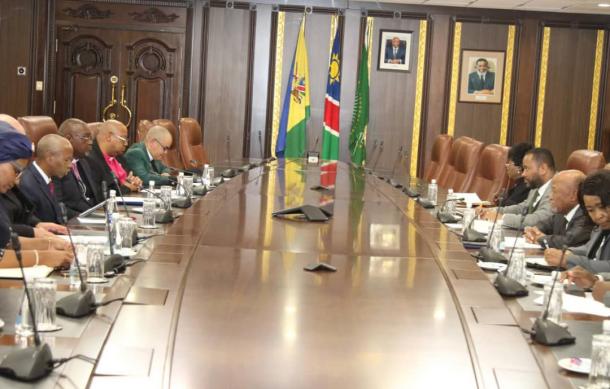
The Council of Churches in Namibia (CCN) has appealed to the government to increase its fishing quota allocation from the current 1000 metric tonnes to 8000 metric tonnes per year.
CCN says the increase in the fishing quota allocation would enable the organisation's sustainability given the government's strained financial resources.
It has therefore submitted a letter to the Ministry of Fisheries and Marine Resources, seeking the quota increase.
It says an 8000 metric tonnes quota, if considered, would help the Council fulfil its obligations in ensuring that Namibians, in their diversity, enjoy basic socio-economic rights and livelihoods.
During a courtesy call on President Nangolo Mbumba, CCN leadership outlined the potential programmes that would be funded from the increased quota allocation.
The Council of Churches in Namibia further petitioned the government for the roll-out of the basic income grant to the most vulnerable citizens.
Their request is informed by the persistent drought, hunger, poverty, and malnutrition, especially reported in the Omaheke Region and other parts of the country.
"This idea originated during your leadership, and we believe that it could be an effective intervention. Bishop Kameeta proposed a basic income grant starting with a modest amount of N$350 in 2015, targeting citizens below the income tax brackets. We hope the government will seriously consider this proposal. As a church, we stand ready to provide support to communities affected by social calamities and drought and advocate for sustainable solutions to mitigate the impact of these crises," said Rev. Heinz Mouton, Chairperson of the CCN Executive Committee.
The Presidency would share the proposals with the relevant ministries, and President Mbumba says the ideas are reasonable.
"I am at least comforted a little bit because you said it was for those who really needed it. The idea that we should give it to everybody, even those who are employed with jobs, makes the figure so big, and it does not make any difference to some people, whether they get $300 or whatever. But those who need it—that is where we should concentrate and address it—the needy, the elderly, the children, those with disabilities—those are the reasonable ideas for us and challenges that we should be able to address."





